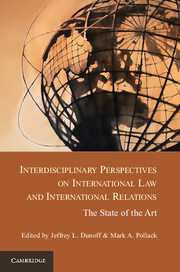 Interdisciplinary Perspectives on International Law and International Relations
Interdisciplinary Perspectives on International Law and International Relations Book contents
- Frontmatter
- Contents
- Contributors
- Acknowledgments
- Part I Introduction: Setting the Stage
- Part II Theorizing International Law
- Part III Making International Law
- 7 Flexibility in International Agreements
- 8 Hard and Soft Law
- 9 Nongovernmental Organizations in International Relations (Theory)
- 10 Regulatory Networks
- 11 Law-Making by International Organizations
- 12 Institutional Proliferation and the International Legal Order
- 13 Legitimacy in International Law and International Relations
- Part IV The Interpretation and Application of International Law
- Part V Enforcement, Compliance, and Effectiveness
- Conclusions
- Index
- References
13 - Legitimacy in International Law and International Relations
Published online by Cambridge University Press: 05 January 2013
- Frontmatter
- Contents
- Contributors
- Acknowledgments
- Part I Introduction: Setting the Stage
- Part II Theorizing International Law
- Part III Making International Law
- 7 Flexibility in International Agreements
- 8 Hard and Soft Law
- 9 Nongovernmental Organizations in International Relations (Theory)
- 10 Regulatory Networks
- 11 Law-Making by International Organizations
- 12 Institutional Proliferation and the International Legal Order
- 13 Legitimacy in International Law and International Relations
- Part IV The Interpretation and Application of International Law
- Part V Enforcement, Compliance, and Effectiveness
- Conclusions
- Index
- References
Summary
Over the past couple of decades, there has been an explosion of interest, both among international lawyers and international relations scholars, in the legitimacy of international institutions (IOs) – what Ian Clark (2005: 12) has described as a “veritable renaissance of international legitimacy talk.” Studies have:
historically traced the changing conceptions of legitimacy in “international society” and “world society” (Clark 2005, 2007);
theorized about the concept of legitimacy (Simmons 1999; Applbaum 2010; Buchanan 2010; Tasioulas 2010);
advanced general normative conceptions of legitimacy (Buchanan 2003; Buchanan and Keohane 2006; Caney 2009);
surveyed the legitimacy of different types of international institutions, including global governance organizations (Koppell 2010), international financial institutions (Porter 2001; Woods 2003, 2006); private governance systems (Cashore 2002; Bernstein and Cashore 2007; Schaller 2007); and public–private partnerships (Bäckstrand 2006); and
examined the legitimacy of particular international institutions, including, among others, the World Trade Organization (WTO) (Howse 2000, 2001; Weiler 2000; Howse and Nicolaidis 2001; Esty 2002; Cass 2005; Picciotto 2005; Conti 2010), the International Criminal Court (Danner 2003), the Security Council (Caron 1993; Sato 2001; Jodoin 2005; Voeten 2005; Hurd 2008), the treaty bodies of multilateral environmental agreements (Brunnée 2002), investor–state arbitral tribunals (Brower 2003; Franck 2005), the Global Reporting Initiative (Beisheim and Dingwerth 2008), the World Commission on Dams (Dingwerth 2005), and the International Organization for Standardization (ISO) (Clapp 1998; Raines 2003).
This recent burgeoning of interest in legitimacy represents a significant shift. Historically, neither international law (IL) nor international relations (IR) had paid much attention to the issue. International lawyers tended to focus on legality rather than legitimacy. And political scientists tended to focus on power and interests, rather than on normative factors such as legitimacy. The newfound concern about legitimacy reflects the growing interest by international lawyers in interdisciplinary studies and the greater openness of political scientists to constructivist perspectives.
- Type
- Chapter
- Information
- Interdisciplinary Perspectives on International Law and International RelationsThe State of the Art, pp. 321 - 342Publisher: Cambridge University PressPrint publication year: 2012
References
- 22
- Cited by


